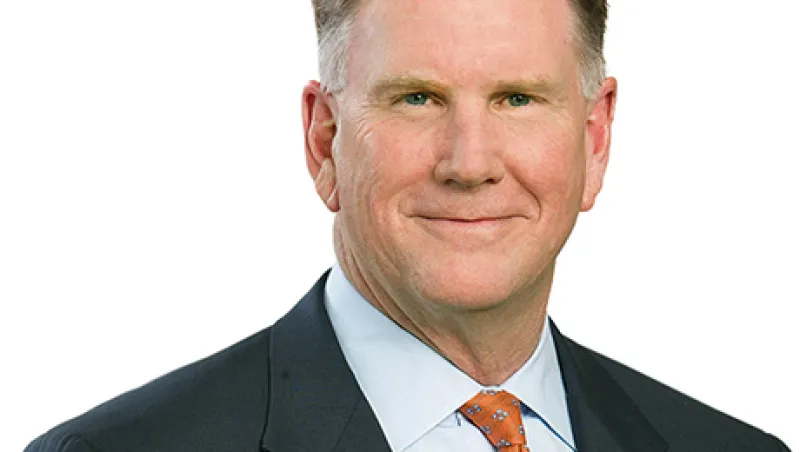Legg Mason president and CEO Joseph Sullivan has his eye on Asia and emerging markets. Since taking charge of the $720 billion, Baltimore-based fund manager in early 2013, Sullivan has made two acquisitions that reveal where he thinks the firm’s future lies. Last March, Legg Mason purchased QS Investors, a $4 billion, New York–based quantitative strategist; in October it took over Edinburgh, Scotland–headquartered emerging-markets specialist Martin Currie Investment Management, about half of whose $10 billion in assets comes from Asian clients.
“We bought Martin Currie and QS Investors because of their strategies that could be distributed to retail investors globally,” says Sullivan, who spoke to Institutional Investor recently in Hong Kong as part of his first trip to Asia as CEO. “Ideally, we would acquire institutional investors that we can leverage globally.”
Sullivan, 57, won’t disclose the value of the two recent purchases, the size of his Asian acquisition fund or the kinds of firms he hopes to buy next. But he says he’ll use organic growth and M&A to build Legg Mason’s presence in the region. The firm first entered Asia in 2005 by taking over Citigroup’s global asset management arm. But today only some 50 of its 2,900 employees are there, and just 11 percent, or about $81 billion, of its total assets are from Asia or Asian investors. “Our market share in Asia is still less than where it should be,” notes Sullivan, who served in senior roles at U.S. investment bank Stifel, Nicolaus & Co. before joining Legg Mason in 2008 as chief administration officer and head of global distribution. “That’s not an indictment of our team, but it is just a matter of ?how we’re very much in growth mode in Asia.”
Legg Mason is competing against rivals such as Fidelity Investments and Schroders, but Asia holds great potential. “The demand for professional investment management services is expected to grow as the rising middle class seeks additional investment destinations for their growing savings pool,” says Wing Chan, director of manager research for Morningstar Investment Management Asia. “Meanwhile, the region’s aging population underpins the need for retirement savings, and mutual funds typically play an integral role in most investors’ retirement solutions.”
Despite slowing growth, Asia remains attractive to U.S. investors, Sullivan contends. Expanding there would give Legg Mason an opportunity to raise funds from Asian clients and diversify internationally. “The world is becoming increasingly volatile,” Sullivan says. “It is our job to help our clients to navigate this increasing volatility.”
In Asia, Sullivan is especially interested in Hong Kong and mainland China, whose new Shanghai–Hong Kong Stock Connect program allows investors in both places to seamlessly allocate to each other’s market, bypassing exchange and capital controls. Sullivan knows that, as the main gateway into and out of China, Hong Kong plays a special role: “It seems China wants to liberalize incrementally, and it tends to want to test in Hong Kong first,” he says.
Besides offices in Sydney, Taipei and Tokyo, Legg Mason has executive staff in Hong Kong and Singapore, the home of its Asian fund administration and design team. Sullivan sees new opportunities in Hong Kong. China is further liberalizing its financial sector with a fund management program modeled on Shanghai–Hong Kong Stock Connect. Known as mutual recognition, the program — which may launch this year or early in 2016 — will let global managers in Hong Kong and domestic managers in China sell into both markets. “We are open to fund-manufacturing capability in Hong Kong, especially with mutual recognition coming,” Sullivan says. Lennie Lim, Legg Mason’s Singapore-based Asia regional head, is bullish on the program: “We see this increasing opportunities for investors on both sides.”
Unlike many of its rivals, Legg Mason consists of several brands that operate independently. Besides Martin Currie and QS, the group includes $440 billion fixed-income specialist Western Asset Management Co., value investor Brandywine Global Investment Management, fundamental research specialist ClearBridge Investments, alternative fund-of-funds manager Permal Group and small-cap investor Royce & Associates.
Under Sullivan’s leadership Legg Mason has reversed a trend of net asset outflows that began in 2008 at the height of the financial crisis. In the quarter ended October 31, the firm posted $700 million in net inflows after Western Asset Management raised $327 million with the initial public offering of its Western Asset Middle Market Income Fund, a closed-end vehicle targeting middle-market corporate debt.
With momentum flagging in developing economies and long-term U.S. prospects uncertain, Sullivan says he and his team will focus on “next-generation active” investment strategies; accounting for almost 30 percent of ?Legg Mason’s lineup, this growing category includes market-neutral and diversified-income products. “Martin Currie and QS Investors have capabilities that allow us to generate more customized solutions tapping into emerging-markets and developing-markets strategies,” he adds. • •






